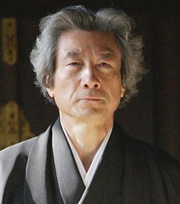|
 Japan
Prime Minister Junichiro Koizumi is used to taking heat from other
countries when he goes to the Yasukuni Shrine,
a century-old war memorial seen by many Asians as a dark reminder
of Japan's militaristic past. But
he got an unprecedented rebuke at home this year, when a court ruled
he had violated the constitution when he paid his respects at the
shrine after taking office three
years ago. Japan
Prime Minister Junichiro Koizumi is used to taking heat from other
countries when he goes to the Yasukuni Shrine,
a century-old war memorial seen by many Asians as a dark reminder
of Japan's militaristic past. But
he got an unprecedented rebuke at home this year, when a court ruled
he had violated the constitution when he paid his respects at the
shrine after taking office three
years ago.
Though largely symbolic, the ruling by a regional court was expected
to heat up a decades-old debate on the legality and morality of
how and where Japanese leaders remember their nation's 2.5 million
war dead.
"We feel completely vindicated," said Tsuneaki Gunjima,
leader of a group of peace activists and religious organizations
who brought the legal challenge. "It clearly acknowledges the
prime minister's visit was unconstitutional."
Yasukuni is a Shinto shrine in downtown
Tokyo that honors all Japanese who have died in the country's wars
- including, most controversially, convicted war criminals from
World War II such as Prime Minister Hideki Tojo.
Koizumi has gone to the shrine four times since becoming prime
minister in April 2001, saying he is praying for peace and paying
tribute to those who sacrificed their lives for their country.
Visits by Koizumi and his predecessors have unfailingly drawn fire
from China, South Korea and other Asian nations with bitter memories
of rampaging Japanese armies.
In Japan, peace activists and others have challenged the practice
on legal grounds, arguing it violates a constitutionally mandated
separation of religion and state.
On Wednesday a district court in the western city of Fukuoka ruled
Koizumi had done just that because he was deemed to have visited
in his capacity as a public official, not a private citizen.
Koizumi used his title when he signed the shrine's visitors book
and arrived at the grounds in a government car.
Japanese courts have sent a mixed message on the issue over the
years, however, and Koizumi played down the significance of the
lower-court ruling.
"I don't know why it violates the constitution...I'm both
a public and private person," he told reporters. "I will
continue my visits."
Wednesday's lawsuit was one of six
filed by activists in district courts around Japan after Koizumi
went to Yasukuni for the first time in August 2001. Two were dismissed,
and the other three courts have yet to hand down verdicts.
The government was not expected to appeal because the Fukuoka court
ruled in its favor on a second issue: it rejected the plaintiffs'
demand for 0,000 in damages for mental anguish allegedly caused
by the visit.
A Japanese court first ruled against the government on Yasukuni
in 1991, saying that then-Prime Minister Yasuhiro Nakasone had violated
the constitution by worshipping in an official capacity six years
earlier.
Koizumi has blurred the distinction between official and private
visits, insisting as he did Wednesday that he pays his respects
"as a prime minister and also as an individual."
|
